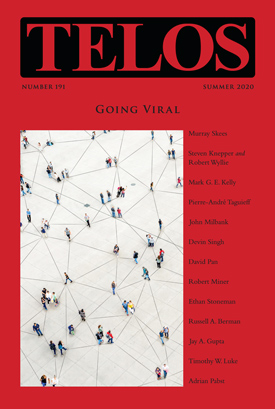Nietzsche once said that culture was only a thin apple peel over a glowing hot chaos. That is probably to say that even a small shock suffices to confront us anew with barbarism and dizzying stupidity. And now we are actually dealing with a worldwide pandemic. In effect, the thin apple peel tore at once and an abyss of the most dangerous folly has opened up. Thus one headline read in the weekly newspaper Die Zeit: “Mankind takes a break—the planet exhales.” One might simply accept as childish impudence calling the lockdown, the curfew that has practically brought the entire global society to a standstill, a “break.” But the madness lies in the presumptuousness of assuming a perspective above humans and of making oneself the voice of the “tortured” earth. Giovanni di Lorenzo, an intelligent, educated man, is the editor-in-chief of that newspaper. But today he evokes Hermann Melville’s captain Benito Cereno: The barbarians have his ship in their hands—and he can do nothing about it.
|
Worse than the concrete fear of some life-threatening reality, such as in the past the Spanish flu or today COVID-19, is the anxiety nourished by the imagination of terror. This is the business of the modern prophets of the apocalypse, who usually show up in the guise of science. They lend support to the great religion-substitute of an infinite environmentalist worry, with which the Party of Prohibitions exploits the guilty conscience of an affluent society. Instead of “What can I hope for?”—a question for which one used to expect an answer from Christianity—they ask: “What must I fear?” This accords to the presumed wisdom of children who want to carry out a world tribunal to save the earth. The pandemic crisis has surfaced fundamental tensions between the scope of state power and commitments to democracy and dissent. Facing an emergency, the state must act vigorously, but liberal democracies are premised on understandings of basic rights, maximal freedom, and limited government, desiderata at odds with state power. This opposition has been playing out in different ways in the United States and in Europe, and in Europe nowhere more saliently than in Germany. A recent controversy in Germany provides insight into the process by which the need to respond to the pandemic acts as a vehicle to enhance state power in a way that threatens basic freedoms. This is the core conflict: the genuine urgency of developing public health measures to contain the pandemic can contribute simultaneously to the augmentation of state power. Questions of the vitality of democracy are at stake, and not only in Germany. The following essay originally appeared in German at Tichys Einblick. Translated by Russell A. Berman, who has written a separate note on the topic here. At the outset I want to make clear that I view the stipulations of the governments for containing the corona pandemic as appropriate and that it is necessary to obey them. Yet this is not the central issue. Instead, the central issue is that the BLM demonstration against racism was widely praised and tolerated, while the demonstration of August 1 [against corona restrictions—trans.] was widely condemned, despite posing identical dangers. The most valuable good for a government is its credibility. One does not need it in a dictatorship, as long as the arguments come from the barrel of a gun. In a democracy, however, credibility is one of the foundational conditions for domestic peace. The following essay was originally published in French as “La Grèce et la pandémie: Quelques réflexions,” in Revue Politique, June 30, 2020, and appears here by permission. Translated by Russell A. Berman.
|
||||
|
Telos Press Publishing · PO Box 811 · Candor, NY 13743 · Phone: 212-228-6479 Privacy Policy · Data Protection Copyright © 2025 Telos Press Publishing · All Rights Reserved |
||||
 It is widely recognized that Greece survived the difficult test of COVID-19 well. The international press has been writing about the “little Greek miracle” for more than a month: a country ravaged by the economic crisis of the past years has been able to resist the public health challenge better than many other European countries. And it is right to emphasize this unexpected success as due primarily to the speed of the government’s decisions, the closing of the borders, the strict lockdown of about two months, but also the population’s obedience to special laws issued by the authorities, both in terms of health and politics. Every evening at 6:00 PM, the epidemiologist Professor Sotirios Tsiodras spoke to the public directly on television about the measures taken and the track of the pandemic, in a calm, humane, and confident tone, showing appropriate emotions when he spoke of the deaths, turning into the family doctor, a personality familiar to everyone.
It is widely recognized that Greece survived the difficult test of COVID-19 well. The international press has been writing about the “little Greek miracle” for more than a month: a country ravaged by the economic crisis of the past years has been able to resist the public health challenge better than many other European countries. And it is right to emphasize this unexpected success as due primarily to the speed of the government’s decisions, the closing of the borders, the strict lockdown of about two months, but also the population’s obedience to special laws issued by the authorities, both in terms of health and politics. Every evening at 6:00 PM, the epidemiologist Professor Sotirios Tsiodras spoke to the public directly on television about the measures taken and the track of the pandemic, in a calm, humane, and confident tone, showing appropriate emotions when he spoke of the deaths, turning into the family doctor, a personality familiar to everyone. 


